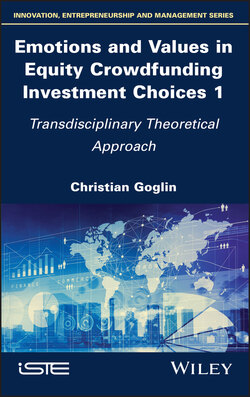Читать книгу Emotions and Values in Equity Crowdfunding Investment Choices 1 - Christian Goglin - Страница 9
Purpose of the research
ОглавлениеThe purpose of this research is to understand, explain and predict the emotional dimension of project choices by ECF investors, without excluding the cognitive dimension. The particular role of a variable of congruence of the investor’s values with those put forward by the project is highlighted, which explains the title of this book. This variable, which is directly related to affective reactions (Schwartz 2006), emerged in the course of the research by means of abductive inference, and was then confirmed theoretically, but also empirically, because of a substantial body of qualitative data. Therefore, from our point of view, the rationality of the investor is complex, an axiological rationality is added to his instrumental rationality, as well as an “affective rationality” that we will define.
This work is exploratory in nature: its aim is to produce an original theory that brings a different and complementary perspective to signal theory. This theory is called the “affective matching” theory; part of its roots lie in the interactionist theory of “Fit-IO” for which individuals are attracted to organizations whose values and norms are congruent with their personal values and norms (Chatman 1989; Kristof 1996; Chapman et al. 2005). The theory of “affective matching” is also in line with the theories of “cognitive consistency” (Vaidis and Halimi-Falkowicz 2007), and it requires the investor to match the project with which they have a minimum “affective distance” or, equivalently, a maximum “affective matching”. The term “affective matching” replaces the term “utility” used in economic decision theory, because the model is not exclusively consequentialist, but nevertheless has similarities with the concept of utility taken from the original meaning of the precursors of decision theory, for which it was a measure of pleasure and punishment (Bentham 1789).
